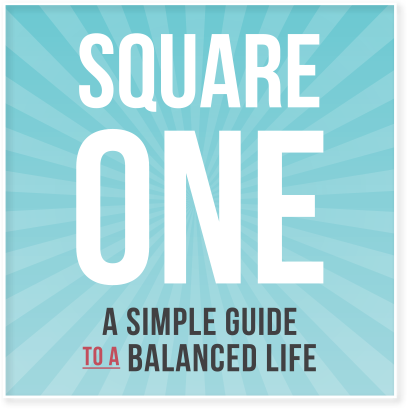The Basis of Square Living
While William H. Danforth, founder of the Ralston-Purina Company, was an outstanding businessman, he is best remembered for being an exemplar of balanced living. In his classic book I Dare You, he wrote “You have not one, but four lives to live—a four-fold opportunity to grow. A body, a brain, a heart, and a soul—these are our living tools. To use them is not a task. It is a golden opportunity.” Square One expands Danforth’s philosophy, combining modern scientific explanations and deeply personal stories to show readers the significance of each side of our squares.
The Body
The physical side of balanced living can’t be obtained by fad diets and quick-fix approaches to exercise. Better long-term health requires two things: real information and real commitment. Square One uses a research-based approach and Dr. Maroon’s own path from depression to wellness to share real, pragmatic ways to maintain both physical and mental health.
Soul
The spiritual side of our squares is often neglected in favor of our tech-heavy, task-oriented lives. But by paying a little bit more attention by being mindful of what’s important to us and the effect we have on others can help us turn away from pain to focus on our joy and higher purpose.
Brain
Work can be one of the biggest draws on our energy and intention. Even the most meaningful work can come to dominate our lives so that we sacrifice our own health, relationships, or sense of self in service of it. To avoid burnout, we have to achieve work/life balance, and Square One may be the tool you need to do it.
Heart
Our relationships help form the basis of who we are. True connections are important not only to make, but to maintain—they keep us grounded, keep us connected, and keep us well.
Maroon’s Quick Tips for Healthful Living
In the new edition of Square One, you talk about burnout syndrome and the havoc it can wreak on one’s personal and professional life. In a culture that places so much emphasis on work, what can we do to stay balanced?
The most essential thing we can do to stay balanced is to have insight into our daily activities. As the Buddhists say, we must be aware and mindful of our feelings or activities and the amount of stress we are experiencing. If we’re not aware and mindful, we won’t be able to take the steps to re-wire or retrain our brains by reorienting our priorities.
You often speak about balanced and mindful living. What does it mean to live mindfully, and how can we incorporate those principles in our daily lives?
Being mindful means being an impartial observer. It is the ability to stay present in the moment without allowing the mind to get sidetracked. Mindfulness is a state of awareness without judgment—awareness of both the long and short-term effects of your everyday choices and decisions.
Spirituality is one of the core areas of focus in Square One. In a world that’s so focused on perceivable reality, what can we do to enhance our spiritual understanding of ourselves and our place in the world?
Spirituality is about discovering, through prayer, meditation, and contemplation, what your real purpose is in life. It is said that the purpose of life is a life of purpose. As I address in Square One, he who has a “why” to live for can bear almost any how. Only by being aware and mindful can we discover our purpose—our why—and we can realize that our purpose may change as we pass through the various seasons of our lives.
People often believe that burnout only happens to those who have stressful careers, such as doctors or police officers. Do you think burnout is limited to stressful professions?
Since publishing my book I have discovered that “burnout” is epidemic not only in professionals, but in students, struggling mothers, soccer moms, and lawyers, often with the heavy incidence of alcohol abuse and incredible stress. It is estimated that at any one time, one out of three physicians experience burnout. Caregivers of family members are over 50%. It is simply epidemic in our current society and one of the reasons that the topics I address in Square One are so important today.
If you could give one ultimate mindful living tip, what would it be?
Be aware and develop insight into the stress produced by our daily activities and then—if possible—try to mitigate the stresses as much as possible. This is sometimes impossible to do because of our job, family, or responsibilities. In that case, physical activity, prayer, and meditation can reduce the toxic cortisol that destroys brain cells and the lining of our blood vessels and results in many of the diseases of aging.

